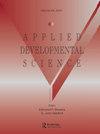Moral reasoning among children in India: The intersection of culture, development, and social class
IF 1.5
3区 心理学
Q3 PSYCHOLOGY, DEVELOPMENTAL
引用次数: 1
Abstract
Abstract The study included 144 Indian children in middle childhood and early adolescence of high and low SES. Based on the cultural-developmental approach, the aims were to test hypotheses about use of the three Ethics of Autonomy, Community and Divinity, and to gain qualitative insights into the children’s indigenous moral concepts. Three findings stood out: 1) Older children employed a rich set of indigenous duty concepts, thereby also using the Ethic of Community more than younger children. 2) Younger children already reasoned in terms of the Ethic of Divinity. 3) High-SES children used the Ethic of Autonomy more than low-SES children and conceptualized the individual in independent and psychological terms; whereas low-SES children’s view of autonomy invoked fear of physical punishment. The cultural-developmental theory and methodology revealed sides of children’s moral reasoning that are largely missing in Western studies, and point to new research directions in moral development and socialization.印度儿童的道德推理:文化、发展和社会阶层的交叉
摘要这项研究包括144名处于儿童期中期和青春期早期的高、低社会经济地位的印度儿童。基于文化发展方法,目的是检验关于使用自主、社区和神性三种伦理的假设,并从质的角度深入了解儿童的本土道德观念。三项研究结果突出:1)年龄较大的儿童采用了一套丰富的土著责任概念,因此也比年龄较小的儿童更多地使用社区伦理。2) 年幼的孩子们已经根据神性伦理进行了推理。3) 社会经济地位高的儿童比社会经济地位低的儿童更多地使用自主伦理,并从独立和心理角度对个体进行概念化;而社会经济地位低的儿童对自主性的看法引发了对体罚的恐惧。文化发展理论和方法论揭示了西方研究中大量缺失的儿童道德推理的侧面,并为道德发展和社会化指明了新的研究方向。
本文章由计算机程序翻译,如有差异,请以英文原文为准。
求助全文
约1分钟内获得全文
求助全文
来源期刊

Applied Developmental Science
PSYCHOLOGY, DEVELOPMENTAL-
CiteScore
12.00
自引率
2.60%
发文量
23
期刊介绍:
The focus of this multidisciplinary journal is the synthesis of research and application to promote positive development across the life span and across the globe. The journal publishes research that generates descriptive and explanatory knowledge about dynamic and reciprocal person-environment interactions essential to informed public dialogue, social policy, and preventive and development optimizing interventions. This includes research relevant to the development of individuals and social systems across the life span -- including the wide range of familial, biological, societal, cultural, physical, ecological, political and historical settings of human development.
 求助内容:
求助内容: 应助结果提醒方式:
应助结果提醒方式:


